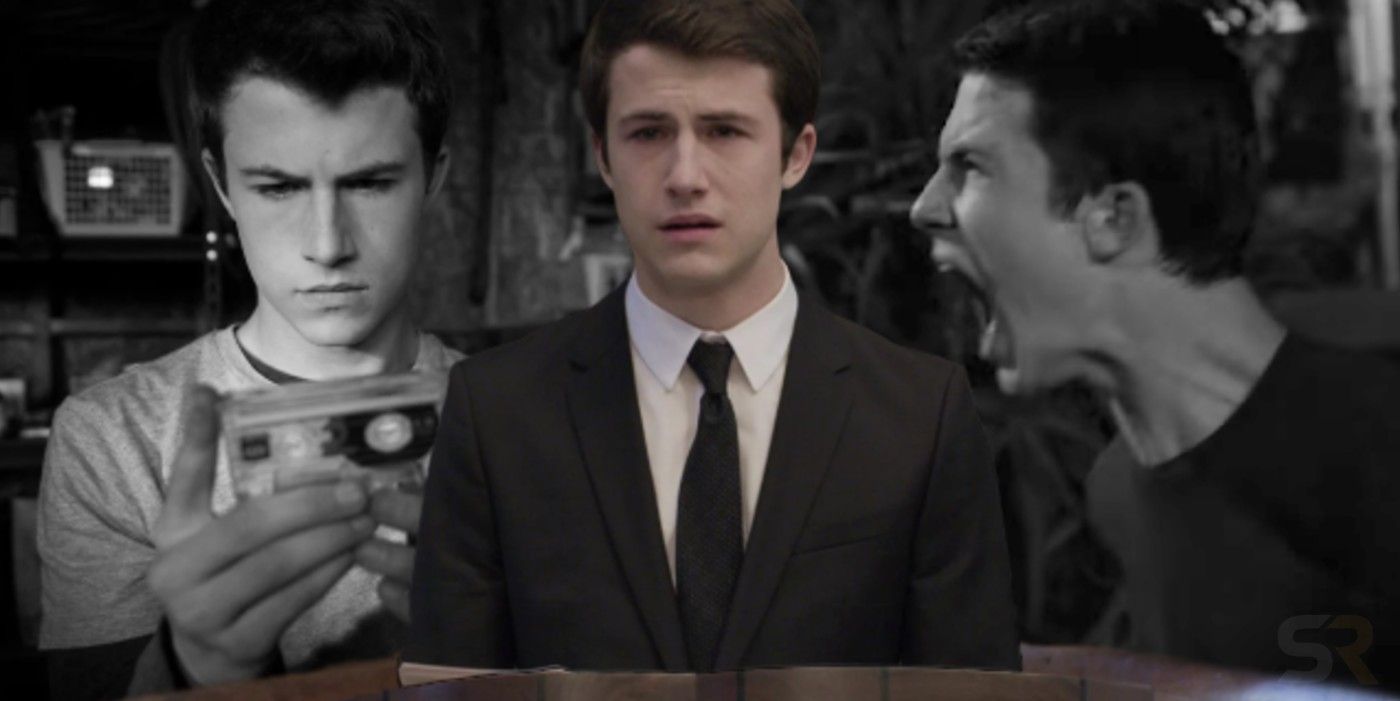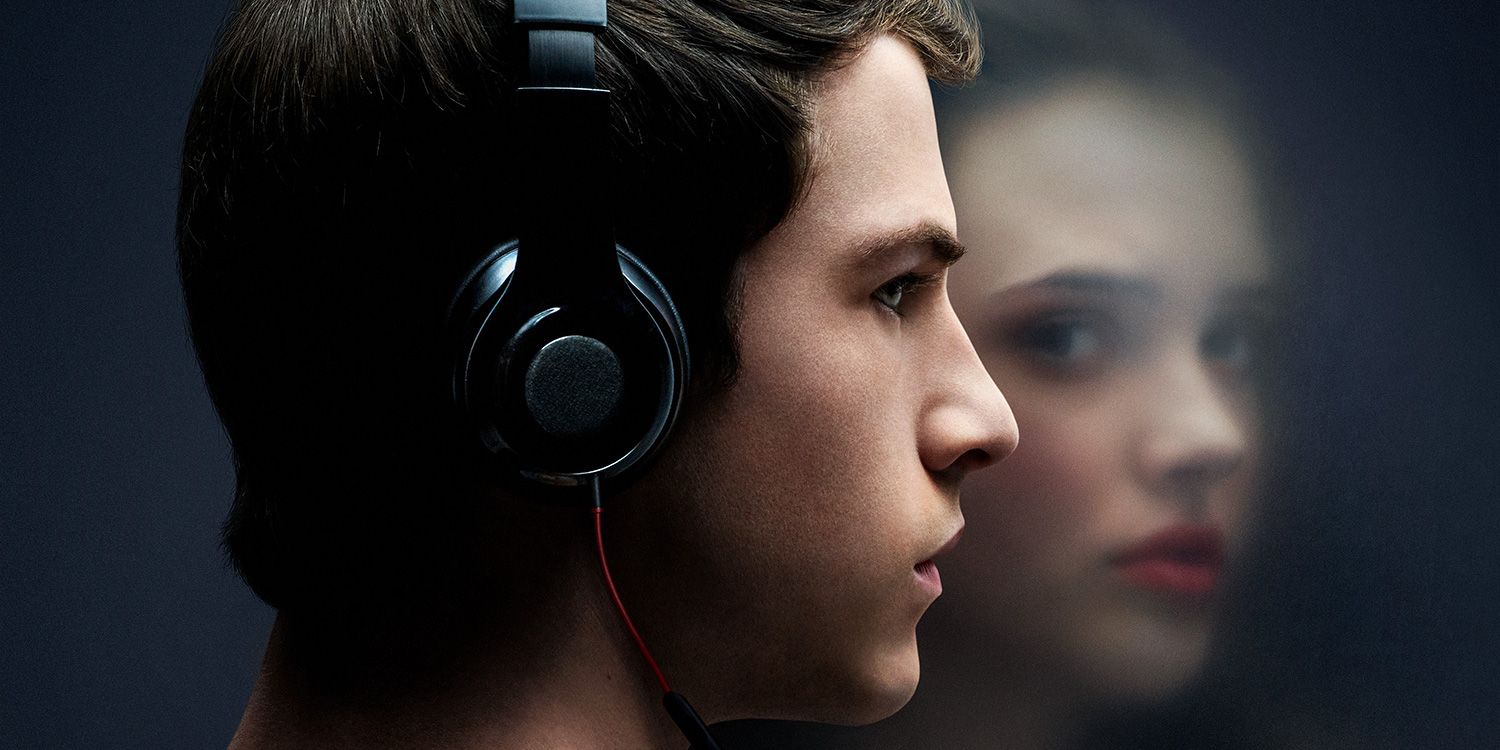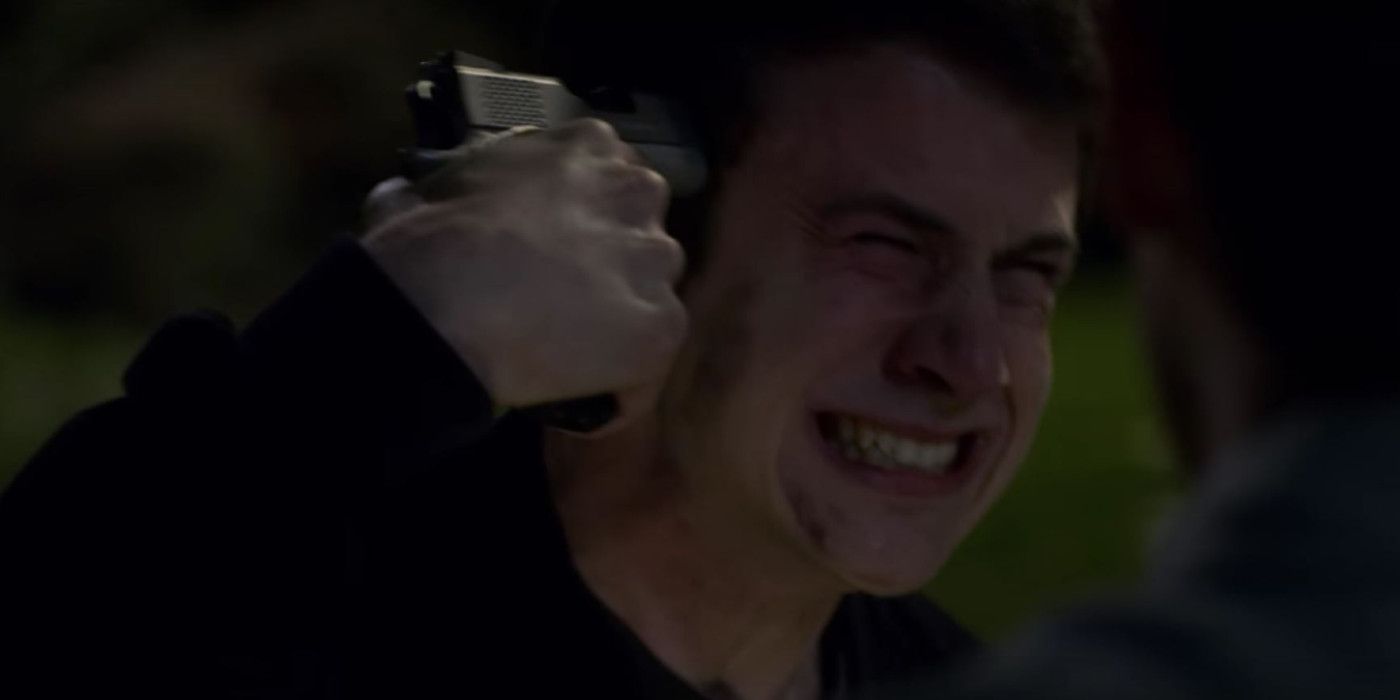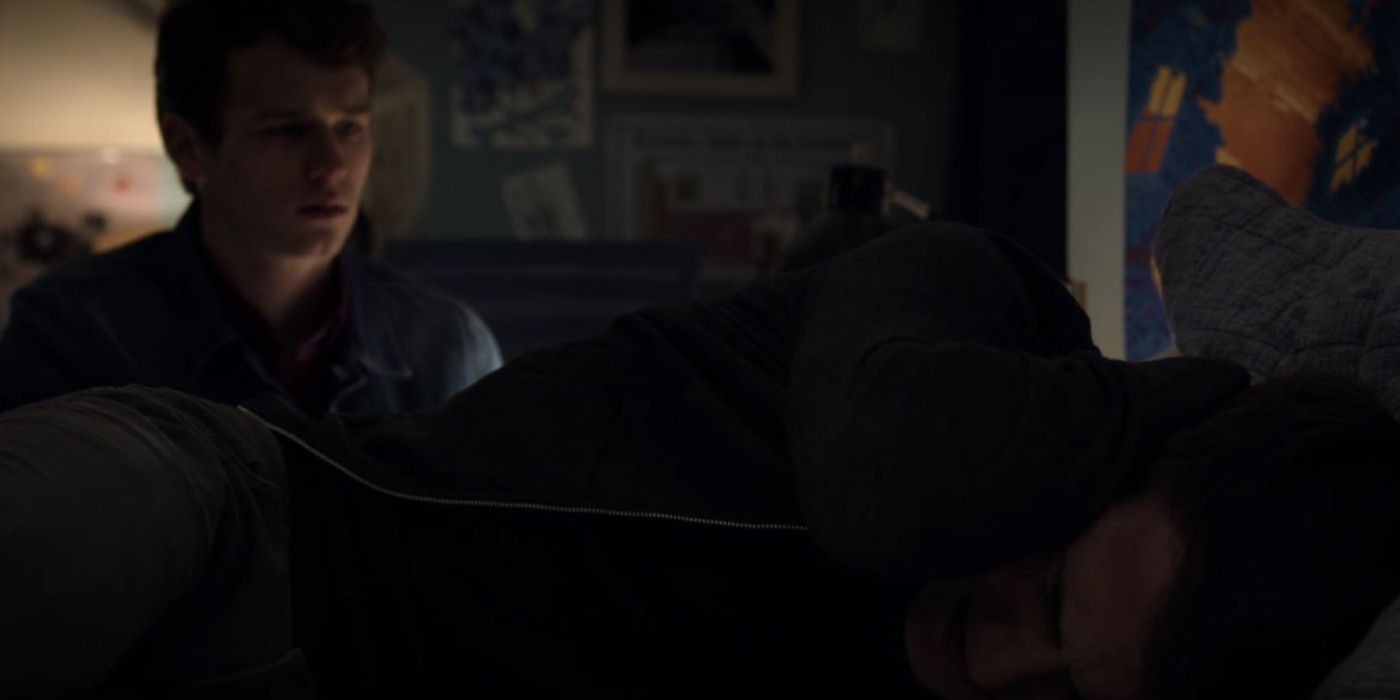Although Netflix's 13 Reasons Why has prided itself on being a show that sheds light on real-world issues, it has continued to outright ignore a huge issue at its core - Clay Jensen's apparent schizophrenia. Based on Jay Asher's book of the same name, 13 Reasons Why debuted on Netflix to huge buzz and even positive reviews. Described as powerful and hard-hitting, the show's first season explored the suicide of Hannah Baker and the thirteen reasons that led her to that decision. Along the way, the show delved into some dark and serious subject matter - including bullying, drug abuse, and sexual assault.
Over time, however, the show began to experience severe backlash regarding their portrayal of depression and, in particular, a scene depicting a suicide. Despite the fact that Netflix eventually removed the offending scene, the criticisms of the show only grew in season 2. Although it could have existed as a one-and-done endeavor, the showrunners opted instead to continue the story, often attempting to address, rebuke, or outright retcon the issues levied at the show between seasons. This was especially noticeable in the way some characters raised the idea that Hannah's tapes could reasonably be construed as a problematic version of revenge rather than a method to provoke social change.
This idea was even more directly explored in the fallout of Hannah's infamous recordings and the web of events that spread outwards from their release. Hannah's parents attempted to sue the school district over their negligence and lack of care. Alex Standall had to rebuild himself following his own guilt-ridden suicide attempt. And Jessica Davis had to cope with the revelations she had been raped and subsequent PTSD. Equally, season 2 added a new collection of serious issues to the mix - including the harrowing sexual assault of Tyler Down in the season 2 finale and the equally controversial depiction of Tyler's attempt at a school shooting. Clay Jensen, however, experienced a brunt of his own emotional trauma in the wake of the tapes. Trauma that manifested in numerous, disconcerting ways and that the showrunners have continually let languish.
Clay Exhibits Schizophrenia In All Three Seasons
Schizophrenia is categorized as a breakdown in the relations between thought, emotion, and behavior, leading to faulty perception and inappropriate actions and feelings. As well as this, the illness also provokes a withdrawal from reality and personal relationships in favor of fantasy and delusion, and a sense of mental fragmentation. Clay Jensen has always been described - by himself and others - as somebody with acute anxiety and who spends a lot of time in his own head. In season one, it was even indicated that he had previously been treated and had medication for said issues. Throughout the inaugural run of episodes, Clay frequently manifested Hannah as he strolled down not only his memory lane but envisioned the scenarios Hannah described. He would ultimately even try to interact with some of the imagined figures - such as, at one particular point, reaching out to touch and console a tearful Hannah. At the time, it seemed little more than a cool visual aid to cut between the past and the present. As time went on, however, the line grew increasingly blurred and belied something far more serious regarding Clay's mental state.
In season 2, the show no longer utilized the narrative trick of Hannah's tapes. Instead, they opted to have a visible manifestation of the character for Clay to directly interact and engage with. Such a technique was no doubt the show's method of keeping actress Katherine Langford around for the new episodes. Unfortunately, the world of 13 Reasons Why was always one that was grounded very much in reality. There was as little a place in the show for an actual ghostly figure as there would be for the protagonists to find a Hellmouth beneath their school. Given, after everything that has occurred at Liberty High across seasons 1 through 3, the latter would make an odd kind of sense. However, it would most definitely require an Olympic-level amount of mental gymnastics to make work in actuality.
Clay would ask the figment of Hannah to clarify things from her past that he had just then been learning. On the surface, she seemed unwilling to answer. In actual fact, however, her lack of answers lent itself even more to Clay being schizophrenic. As such, Hannah COULDN'T answer - since she was merely a product of his mind rather than a genuine version of Hannah that came complete with her memories. Things escalated to the point that Clay's vision of Hannah began to simply recite the description of her sexual assault from the tapes. Unable to bear it anymore, Clay frantically covered his ears and proclaimed that he was unable to take it anymore. It was only when his future adopted brother, Justin Foley, entered that Clay was able to snap out of it and regain some semblance of control over his mind.
With it looking increasingly as though Bryce Walker was going to get away scot-free with his crimes, however, Clay's mental state spiraled further. As a result, he decided to take matters into his own hands. Still tormented by Hannah repeating her traumatic experience over and over again, Clay took one of the guns he had received from Tyler and went to confront Bryce. Though Clay had every intention of shooting Bryce during the ensuing confrontation, he also at one stage even pointed the gun at his own head, tearfully declaring that she wouldn't stop, referring to Hannah. In the end, it again fell upon Justin to talk Clay down. When Justin, unable to see or hear Hannah, asked what was happening, Clay worryingly inferred that he believed he was acting out Hannah's will.
The show would continue with the idea of it being little more than a ghostly figure until the season 2 finale, when, at a memorial for Hannah, Clay was portrayed as finally being able to say goodbye and let go. Unfortunately, such symptoms returned briefly in season 3, when Clay had another hallucinatory moment. This time, however, it was with a representation of the now-deceased Bryce. Clay's imagined, somehow even more sadistic version of the bully taunted and provoked him, causing him to once again lash out uncontrollably.
13 Reasons Why Season 3 Overlooks Clay's Issues
For a time, it appeared as though the show would finally address the issue in season 3. In the aptly titled episode, "There Are a Number of Problems with Clay Jensen", security footage of Clay's near-fateful visit to Bryce Walker's house a season prior emerged. As a result, Clay's parents sat down and discussed it. They even questioned Justin directly regarding Clay's state of mind on that particular night. Unfortunately, as the Justin character is increasingly want to do, he covered for his newly adopted sibling - stating that Clay was only "a little out of his mind that night but that it was only that night". Equally, Justin also dismissed it as little more than grief and stress. Clay's father followed up by asking specifically whether he was simply thinking about Hannah or whether he was literally hearing her in his head. While Clay's wholly inconsistent parents seemed unconvinced by Justin stating it was merely the former, they opted not to pursue it. And by the end of the season, they had once again forgotten about the subject (and even the conversation) altogether.
This appears to be a perfect reflection of the show's handling of issues. As is the case with the majority of issues that the show tries to tackle, they don't actually tackle them at all. In fact, the show has appeared to adopt a laundry list approach to shining a light on issues. Across the seasons, it's painfully apparent that the show is content with including serious real-world issues, as though checking off a list, without actually exploring the depth and complexity of those issues, much less delving into solutions and ways of overcoming them. It was apparent in the handling of Jessica's perspective with regards to her assault in season 1. It was even more apparent in their depiction of an attempted school shooting in season 2. As such, the show's mantra of addressing the very real issues facing the youth of today has gone largely unfulfilled.
How 13 Reasons Why Season 4 Can Address It
That will truly be the question hanging over what will be the fourth and final season. To spend three seasons not even officially diagnosing Clay's obvious mental illness was bad enough. But to continue to dismiss it as part and parcel of him being merely an anxious teenager that overthinks too much would be woefully irresponsible. Mental illness, after all, isn't so easily solved or dismissed. If 13 Reasons Why really wants to conclude as a truly socially relevant show, it needs to do more than loosely touch on the existence of such issues. There are a number of ways the show could do so. And in a better way than they touched on Skye's bipolar disorder and subsequent shipping off to a facility, barely to be heard from again. It needs to commit to the idea and it needs to address properly the toll such an illness can take. As well as that it needs to demonstrate how not only can such a condition be dealt with and represent how one can live a functional life with it.
The show has a track record with retroactively combating the criticism levied at it, even if that meant also retconning their history. Fresh off of season 1's backlash regarding the tapes, the show had character's repeat the very things vocal critics offered. Following debates regarding the handling of Jessica's sexual assault, they delved more deeply into her PTSD in season 2 and featured prominently her reclaiming her power and her body in season 3. It also featured an admittedly powerful "Me Too" moment and delved a little more into Tyler's road to recovery, as he faced his trauma head-on by actually opening up about it and accepting support from a new school counselor. Given that season 3 ended with the discovery of Tyler's discarded guns, it's likely the trend of retroactively addressing its complaints and issues will continue.
The aforementioned counselor could prove a good step to bring light to the issue fully. Then again, there is also the Kevin Porter character, who emerged in season 3 as pursuing a new career in therapy. Although the third season saw him used as a tool to help the divisive humanizing of Bryce Walker, Mr. Porter could return to officially work with Clay in a similar capacity. Given that both characters have proven ignorant to the full potential extent off Clay's troubles, it will likely be entrusted to a new character. With Gary Sinise reportedly cast as Dr. Robert Ellman, a therapist set to work with Clay, it will likely be him that could finally bring attention to the character's potential illness. Since the doctor is described as focused on anxiety, grief, and depression, however, it could equally be that the show will once again drop the ball as it did in its first three seasons.
13 Reasons Why season 1-3 is currently available via Netflix, with season 4 expected to premiere in 2020.




